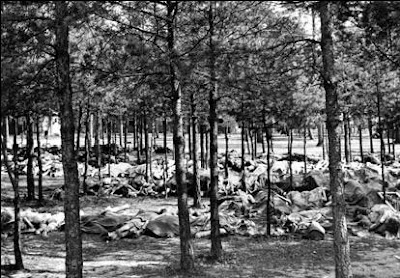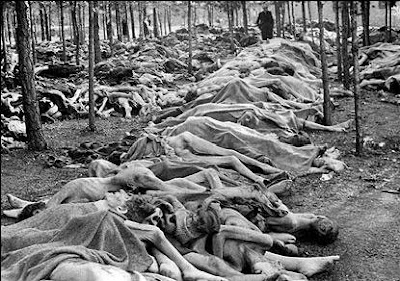On this date in 1945 advancing British troops liberated the concentration camp of Bergen-Belsen in north-eastern Germany.
It was one of the most ghastly discoveries of the Second World War, in a year filled with such horrors. As Richard Dimbleby described it to BBC listeners in a radio report:
Here, over an acre of ground, lay dead and dying people. You could not see which was which, except perhaps by a convulsive movement, or the last quiver of a sigh from a living skeleton too weak to move.
The living lay with their heads against the corpses, and around them moved the awful ghostly procession of emaciated, aimless people with nothing to do and no hope of life, unable to move out of your way, unable to look at the terrible sights around them.
There was no privacy, nor did men or women ask it any longer. Women stood and squatted stark naked in the dust, trying to wash themselves and to catch the lice on their bodies.
Babies had been born here, tiny wizened things that could not live. A mother, driven mad, screamed at a British sentry to give her milk for her child, and thrust the tiny mite into his arms and ran off, crying terribly. He opened the bundle, and found the baby had been dead for days.
This day at Belsen was the most horrible of my life.
Over the next few weeks British servicemen and medical personnel moved thousands of survivors to a nearby tank training complex and tried to nurse them back to health. Tragically, thousands more died after being rescued – they were simply too far gone to recover. Their rescuers unwittingly contributed to some deaths by giving food to the survivors that was too rich for their bodies to digest. As then-Major Leonard Bernley later described the situation:
I remember being completely shattered. The dead bodies lying beside the road, the starving emaciated prisoners still mostly behind barbed wire, the open mass graves containing hundreds of corpses, the stench, the sheer horror of the place, were indescribable. None of us who entered the camp had any warning of what we were about to see or had ever experienced anything remotely like it before.
. . .
I was given the job of scouting the district, and in particular a German Army Panzer (Tank) barracks which was reportedly nearby, to find and requisition food supplies for the camp. I took a jeep and one or two soldiers and soon located the barracks. It contained very large quantities of food. I also located a well-stocked dairy in the village near the camp.
The Panzer Barracks at Hohne, a short distance from the Belsen camp, was quickly converted into a vast hospital and a transit camp. I was given the job of supervising the sending of those who were not desperately ill from the old camp to this new camp. The process was for the prisoners to discard all their clothes, to go under the showers (which we had rigged up), be thoroughly de-loused with DDT, sprayed with pressure air hoses (which we had also rigged up), get dressed in clothes commandeered from the German civilian population, and then be loaded onto lorries to be ferried up to the new camp in the Panzer barracks.
I and some of our soldiers and a group of conscripted German civilian nurses worked 12 to 14 hours a day, ‘processing’ several thousand weak and sick people every day. Even at this rate, it took two or three weeks to empty the camp. This meant that thousands of prisoners had to wait in the old disease-ridden camp until we could shift them out to safety. As soon as the last prisoner had left, Belsen Concentration Camp was burned down.
. . .
In all, I was involved with the liberation of Belsen camp for over three months. Eventually, I handed over the camp to UNRRA (the United Nations Relief and Rehabilitation Agency) and I was posted to the State of Schleswig as British Army Military Governor. In September 1945 I was called to Luneburg to give evidence at the War Crimes trial of Kramer and the other 43 SS guards. The court sentenced Kramer and nine others of the guards to death.
People asked me, ‘What was it like?’ No words of mine could adequately describe the sights, the sounds, the stench, and the sheer horror of that camp, and I will not attempt to do so here.
. . .
At the time, some politicians and religious leaders criticized the British Army for not having done enough to relieve the suffering of the prisoners. As one who was there, the task before us was the like of which nobody had any knowledge or experience. Neither had we the slightest idea of what we were to discover. All of us were in a state of utter shock – young soldiers (most were in their ‘teens or early twenties) as well as senior officers. I, myself, had turned 25 only a few days before.
What SHOULD you do when faced by 60,000 dead, sick and dying people? We were in the army to fight a war and to beat the enemy. What we were suddenly thrust into was beyond anyone’s comprehension, let alone a situation which could have been organized and effectively planned for. For example, one terrible fact: many hundreds, perhaps thousands, of starving people died BECAUSE we fed them the only food we had, our army rations – who in the circumstances could be level-headed enough to think that out in advance?
It was said that after a few days, General Montgomery, the British Army C-in-C, told General Eisenhower, the Allied Supreme Commander, ‘…either we deal with Belsen camp, or we get on with the war – we can’t do both!’
For decades after the war, no birds flew near the site of the Bergen-Belsen concentration camp. Many visitors commented on the eerie silence there. The birds have now returned, and it’s theorized that the immense quantities of lime spread over the site to kill the typhus-carrying lice that infested the camp may have caused their absence. They returned after the lime had finally been absorbed by the soil.
Be that as it may, I knew two people who took part in the liberation of Bergen-Belsen. I spoke with both of them about it at different times, and both had the same reaction.
They burst into tears.
They were battle-hardened men, soldiers who’d killed many enemies over the course of the war . . . but they couldn’t stand the memory of that terrible day in April, 1945, when their tanks rolled into Belsen and their world changed forever.
Lest we forget.
Peter



For ill or good, I too have had the honor of seeing men whom I thought were solid granite crumple down or turn away and just stare off someplace when they (extremely rarely) will even talk about the various camps they helped to close (they never say liberate).
I’ve talked to the same kind of men that get a similar stare when talking about horrific missions, like putting the first raids over Tokyo (not the Dolittle ones) where they stripped the guns off the bombers to get them there due to weight. They were under constant attack for six hours, no way to shoot back and most of the men they had breakfast with were dead by supper.
I then think about the men that could do things to other human beings, men…women..even children and babies…and do it for so long. And it turns my own stomach to think anyone could be that evil.
The capacity of mankind for good and evil acts is astonishing. And to see those that have stood before both great evil and profound good is both enlightening and humbling.
And I thank God I’ve never had to face what these folks did and hope I never will. But I agree…we can NOT afford to let anyone succeed in changing history to lessen the horror nor can we let the world forget.
Certainly there are still those among us that CAN’T forget.
Read “Ordinary Men” . The guys doing the killing were no different than a lot of us. They followed orders, were conditioned, and eventually it seemed normal. It is important to realize they were not aberrations -just normal human beings adapting to events.
LOOK IN ANY TOWN, AND YOU WILL FIND A BUNCH OF PEOPLE WHO WILL DO EXACTLY WHAT THE NAZI’S DID, WITH SOME INDOCTRINATION AND ORDERS.
Sure, a lot of them will not-and for the most part, they will be allowed to walk away and do something else-but enough will obey orders to get the killing done.
And the hatred required to set the machinery in motion is always present. Especially from those who are filled with a sense of self importance-both on the left and the right. It’s all for our FUTURE, don’t you see?!
I suppose I can understand what you say but I can’t see watching another human being suffer as those in the camps did and not be moved. Maybe I’m an exception, maybe I’ve been conditioned in another way. I don’t know. But the stories, the images and the little I have come to know tells me that I can’t believe a “normal” person could ever stand by and watch it much less do it.
Dear God. To even read about and see images of what those poor people suffered at the hands of these evil people is gut-wrenching and heartbreaking. We often remember and think about the survivors of the camps. But how often do we think about the trauma suffered by those who rescued them and closed the camps?
You did what you could. Those of us who live free know that we live such because of the sacrifices of those of you who stood between them and us.
Thank You, from the bottom of my heart.
And to think there are still holocaust deniers out there. Unbelievable.
horrors.
I note that the original video clip is no longer available. To see the original British Pathé footage of the camp, immediately after its liberation:
https://www.youtube.com/watch?v=y6gSinaRrIs